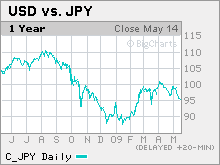Dollar rallies on Japanese comments
Japan's finance minister suggests authorities will intervene to curb further yen strength, sending dollar higher.
NEW YORK (Reuters) -- The U.S. dollar rose against the yen Monday after comments by a top official in Japan spurred speculation of intervention by authorities to curb further strength in the Japanese currency.
Japan's vice finance minister, Kazuyuki Sugimoto, said Monday he was watching foreign exchange market moves carefully, and he hoped they would not have a negative effect on the economy.
The yen dropped from a two-month high against the dollar hit earlier in the global session and also slid versus the euro, sterling and commodity currencies. The dollar fell 3.8% versus the yen last week, the biggest weekly drop since last October.
"Basically, the MOF put the market on notice that they don't want to see yen appreciation beyond 95 to the dollar," said Brian Dolan, chief currency strategist at Forex.com in Bedminster, N.J.
In midday trading in New York, the dollar rose to a session high of 96.19 yen and was last up 0.9% at 96.05 yen, recovering from a two-month low at 94.55 yen on trading platform EBS.
The euro gained 1.1% to 129.74 yen after earlier hitting a three-week low at 126.99 yen.
The euro was up slightly versus the dollar at $1.3503 . The ICE Futures' dollar index, a gauge of the greenback's value against six major currencies, fell 0.2% to 82.804
A rise in stocks worldwide and strengthening crude oil prices fueled the view that the global downturn may be slowing, boosting investor appetite for risk and lifting commodity currencies such as the Australian and New Zealand dollars.
"I think all of the moves are consistent with the general improvement in risk appetite," said Omer Esiner, senior market analyst at Ruesch International in Washington.
"We have also seen the dollar bloc currencies (Australian and New Zealand dollars) rallying." He said that was an indication that investors were more inclined to take on additional risk with currencies that provide higher yields than the greenback and yen.
Both the U.S. dollar and yen typically rise when investors turn risk averse and slip when risk appetite improves.
The Australian dollar rose 1.5% to US$0.755, while the New Zealand dollar gained 0.9% to US$0.5907.
The pound, meanwhile, gained 0.8% to $1.5287, as investors brushed off calls for a dissolution of parliament in the latest twist in an expenses scandal involving British lawmakers.
The pound, which has become a proxy for risk since the UK financial sector and overall economy have been battered by the global credit crisis, also benefited from higher stocks. ![]()


